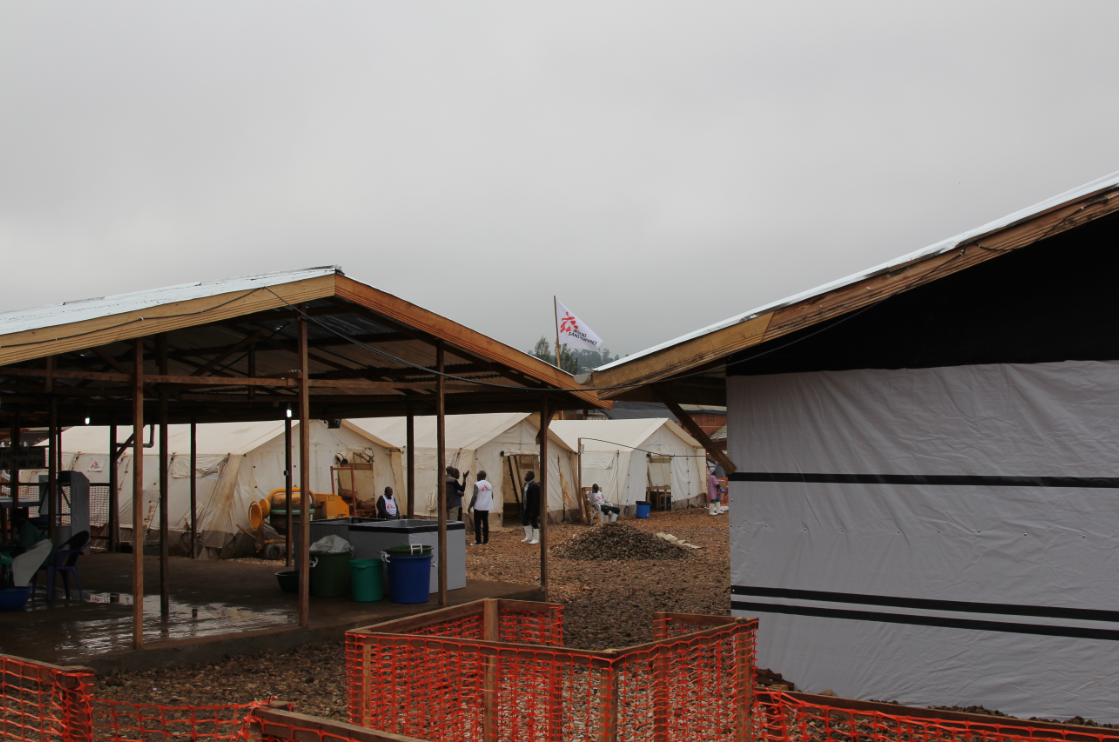Following the recent spike in the number of new confirmed cases in the area, Doctors Without Borders (MSF) is stepping up its efforts in the response.
“The objective of this transit centre is to boost the overall capacity for patient care in Beni: since the city became the new focus of the outbreak in October, new confirmed cases have been frequently appearing in several neighbourhoods. The new transit centre was built very close to the existing Ebola treatment centre, whose capacity has been saturated; their proximity will bring the various components of the response in town closer together” says Marie Burton, Project Coordinator.
The facility was built on a former football pitch measuring 8,000 square metres and required a week’s worth of fast-paced construction work.
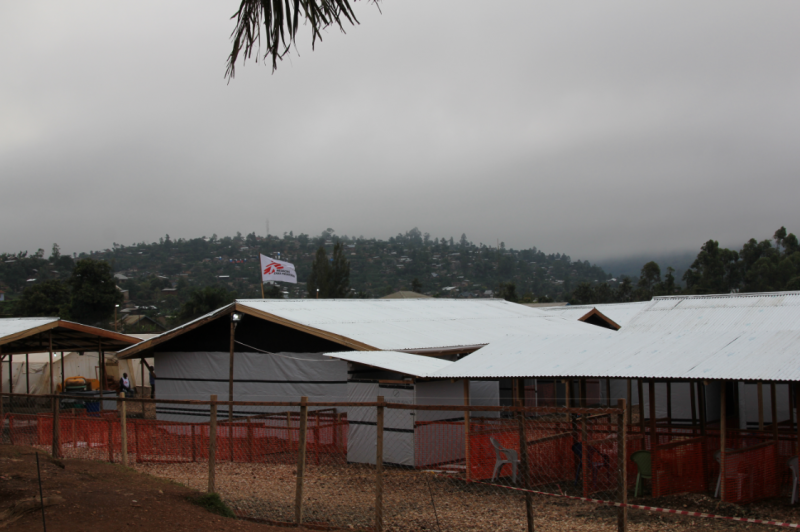
Helped by the very same youths who used to play football on those grounds, MSF teams worked through frequent thunderstorms and overcame major logistic hurdles to complete the works as quickly as possible. Suspect Ebola patients will be admitted to the transit centre pending confirmation of their laboratory analyses.
MSF medical staff will provide immediate care according to a person’s clinical status; once the diagnosis is confirmed, patients positive to Ebola will be transferred to the nearby treatment centre while those who proved negative will be transferred to other health facilities, where further care will be provided.
Until recently, both confirmed and suspect cases were admitted to the treatment centre, though the two wards were isolated.
In the new centre, individual rooms were preferred to large tents in order to improve patient isolation. Partitions were fitted with large Plexiglass windows for medical staff to maintain visual contact with patients, but also for the latter to be able to see their family and loved ones when they visit.
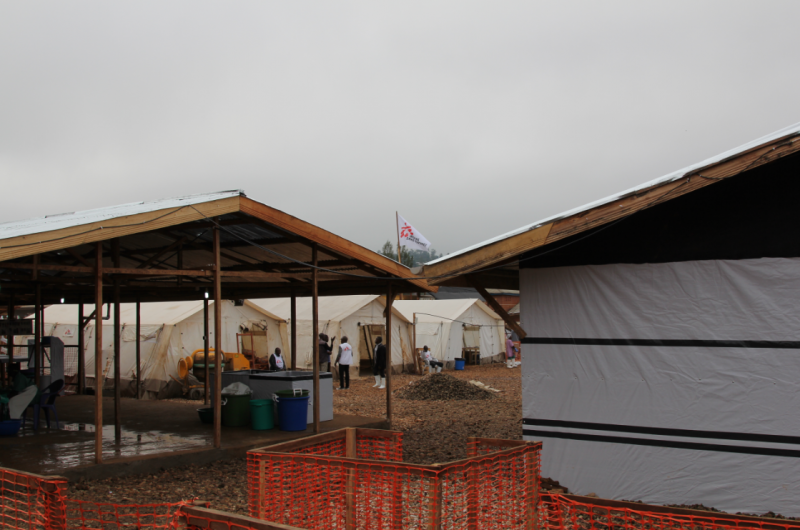
The centre’s initial capacity of 16 beds can be increased to 32 and even 48 in case of need, based on how the outbreak plays out.
Teams are increasingly busy with the tracing of suspect cases, as the epidemic has reached a new level. As many as 30 new suspect cases are identified every day and admitted to the ETC in Beni.
The worst Ebola outbreak ever known in DR Congo
In just over three months since its declaration, this Ebola epidemic – the tenth in DRC’s history – has turned into the worst ever recorded in the country. To date, 341 cases have been identified, of which 303 were confirmed.
The epicentre moved from the small town of Mangina, where the first few cases were found, to the larger city if Beni, where the number of new suspect and confirmed Ebola patients has risen steadily for weeks, until the complete saturation of the capacity for patient care.
Since 1 August the virus has killed 215 people and several organisations are doing their best to prevent it from spreading further.
More than 100 patients have been able to recover so far. In an area where insecurity is rife and access to parts of the population can be difficult, the intervention has faced serious challenges and the outbreak has not been contained yet.
“Since the focus of the epidemic moved from Mangina to Beni, the outbreak has become harder to control; we now observe an increasing number of new cases further the south, in the even bigger city of Butembo: we fear the situation might become even harder to manage, unless the response in this area is significantly strengthened” says Gwenola Seroux, Emergency Cell Manager for MSF in Paris.
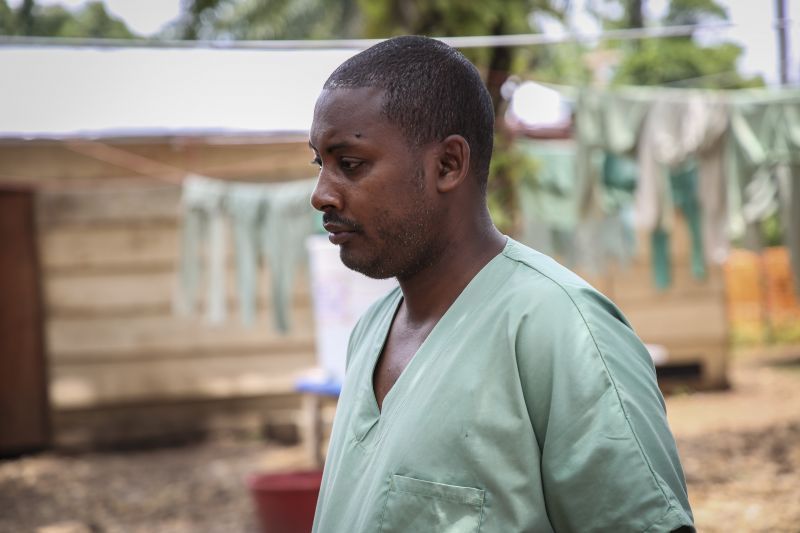
The past few weeks have indeed recorded a noticeable increase of the new cases in Butembo, a regional hub for trade, a stone’s throw away from the Ugandan border.
The latest developments here call for more resources and attention, with the risk of this large city becoming a new hotspot for the outbreak.
Community engagement
In addition to the challenge of an ever-moving population, many of the struggles for the response have been caused by the population’s fear of such a deadly disease – which can get in the way of the relationship between communities and health workers.
As a result, we often observe reluctance to signal new cases, report to treatment centres or accept the intervention of the teams responsible for ensuring safe and dignified burial of Ebola victims.
“We observe the need for better, more effective communication by all players participating to the response in order to win people’s trust. Mortality rates are very high; people may be led to believe that treatment centres are places where you go to die, when in fact dozens of patients were able to recover. Being admitted to a treatment centre at an early stage of the sickness enhances one’s chances to recover” says Dr Axelle Ronsse, MSF Emergency Coordinator for the Ebola intervention.
MSF active on the pillars of the Ebola intervention
MSF has been present in Beni since the start of the outbreak in August 2018 and is active on several fronts, aiming to contain the spreading of virus and address the needs of the North Kivu population.
Along with other organisations who participate to the response, MSF teams pay regular visits to 24 health centres to provide training and material; they also hold regular meetings with the local communities in order to share information about the disease and the ways to avoid contagion.
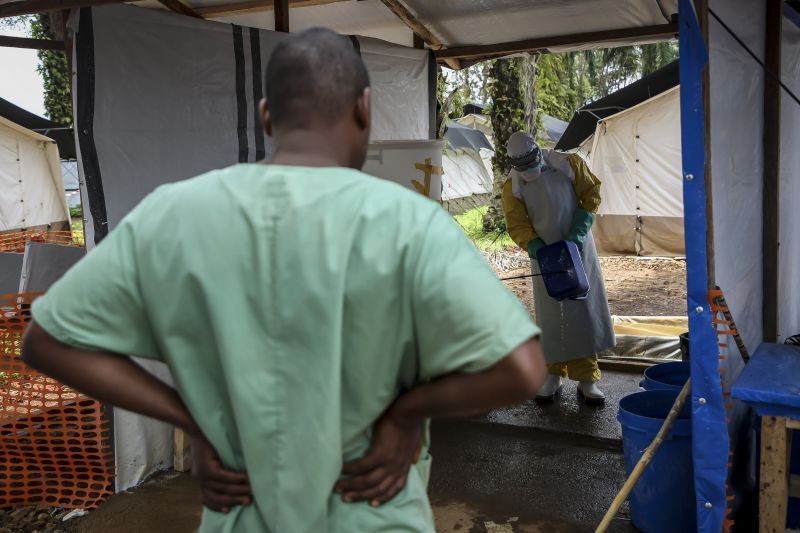
As part of MSF’s infection prevention and control activities, its teams offer decontamination to health centres following the identification and transfer of confirmed Ebola cases towards the appropriate facilities.
MSF teams also vaccinated over 600 people, either frontline health workers or potential contacts of Ebola patients in the city of Beni in October. Vaccination has likewise been provided in the city of Butembo in November.
Since the start of the epidemic on 1 August 2018, MSF teams participate to the Ebola response in North Kivu and Ituri. MSF opened treatment centres in the cities of Mangina, Butembo and Tchomia (the latter is now closed), an isolation centre in the city of Bunia and now a transit centre in Beni. Independent of any political, religious or military authority, MSF acts with impartiality, according to its evaluation of medical needs. The independence of the association is ensured by a reliance on private donations for over 80% of its funding.
Find out more about MSF's Democratic Republic Congo.
